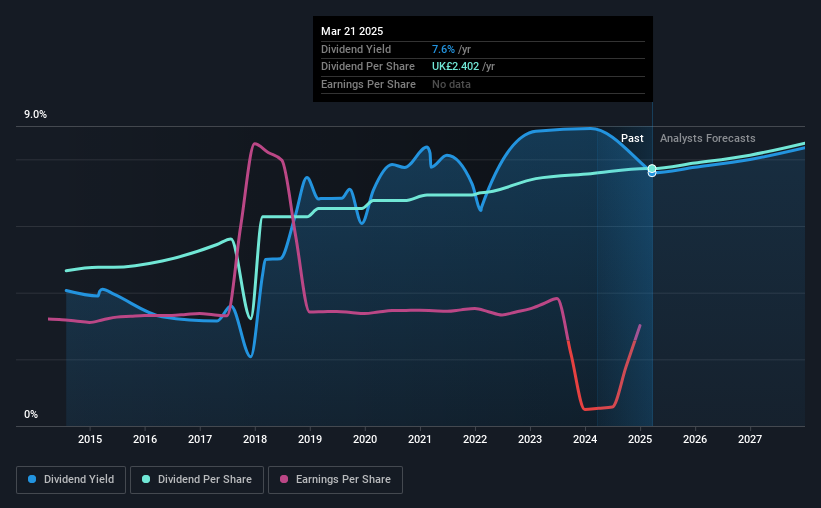- United Kingdom
- /
- Tobacco
- /
- LSE:BATS
Here's Why We're Wary Of Buying British American Tobacco's (LON:BATS) For Its Upcoming Dividend
Readers hoping to buy British American Tobacco p.l.c. (LON:BATS) for its dividend will need to make their move shortly, as the stock is about to trade ex-dividend. The ex-dividend date is commonly two business days before the record date, which is the cut-off date for shareholders to be present on the company's books to be eligible for a dividend payment. It is important to be aware of the ex-dividend date because any trade on the stock needs to have been settled on or before the record date. In other words, investors can purchase British American Tobacco's shares before the 27th of March in order to be eligible for the dividend, which will be paid on the 7th of May.
The company's next dividend payment will be UK£0.6006 per share. Last year, in total, the company distributed UK£2.40 to shareholders. Based on the last year's worth of payments, British American Tobacco has a trailing yield of 7.6% on the current stock price of UK£31.62. If you buy this business for its dividend, you should have an idea of whether British American Tobacco's dividend is reliable and sustainable. As a result, readers should always check whether British American Tobacco has been able to grow its dividends, or if the dividend might be cut.
If a company pays out more in dividends than it earned, then the dividend might become unsustainable - hardly an ideal situation. British American Tobacco distributed an unsustainably high 176% of its profit as dividends to shareholders last year. Without extenuating circumstances, we'd consider the dividend at risk of a cut. That said, even highly profitable companies sometimes might not generate enough cash to pay the dividend, which is why we should always check if the dividend is covered by cash flow. It paid out more than half (55%) of its free cash flow in the past year, which is within an average range for most companies.
It's disappointing to see that the dividend was not covered by profits, but cash is more important from a dividend sustainability perspective, and British American Tobacco fortunately did generate enough cash to fund its dividend. If executives were to continue paying more in dividends than the company reported in profits, we'd view this as a warning sign. Extraordinarily few companies are capable of persistently paying a dividend that is greater than their profits.
View our latest analysis for British American Tobacco
Click here to see the company's payout ratio, plus analyst estimates of its future dividends.

Have Earnings And Dividends Been Growing?
Businesses with shrinking earnings are tricky from a dividend perspective. If earnings decline and the company is forced to cut its dividend, investors could watch the value of their investment go up in smoke. Readers will understand then, why we're concerned to see British American Tobacco's earnings per share have dropped 11% a year over the past five years. Ultimately, when earnings per share decline, the size of the pie from which dividends can be paid, shrinks.
Many investors will assess a company's dividend performance by evaluating how much the dividend payments have changed over time. Since the start of our data, 10 years ago, British American Tobacco has lifted its dividend by approximately 5.2% a year on average. The only way to pay higher dividends when earnings are shrinking is either to pay out a larger percentage of profits, spend cash from the balance sheet, or borrow the money. British American Tobacco is already paying out 176% of its profits, and with shrinking earnings we think it's unlikely that this dividend will grow quickly in the future.
The Bottom Line
Is British American Tobacco an attractive dividend stock, or better left on the shelf? Earnings per share have been in decline, which is not encouraging. Worse, British American Tobacco's paying out a majority of its earnings and more than half its free cash flow. Positive cash flows are good news but it's not a good combination. Overall it doesn't look like the most suitable dividend stock for a long-term buy and hold investor.
With that being said, if you're still considering British American Tobacco as an investment, you'll find it beneficial to know what risks this stock is facing. Case in point: We've spotted 3 warning signs for British American Tobacco you should be aware of.
A common investing mistake is buying the first interesting stock you see. Here you can find a full list of high-yield dividend stocks.
Valuation is complex, but we're here to simplify it.
Discover if British American Tobacco might be undervalued or overvalued with our detailed analysis, featuring fair value estimates, potential risks, dividends, insider trades, and its financial condition.
Access Free AnalysisHave feedback on this article? Concerned about the content? Get in touch with us directly. Alternatively, email editorial-team (at) simplywallst.com.
This article by Simply Wall St is general in nature. We provide commentary based on historical data and analyst forecasts only using an unbiased methodology and our articles are not intended to be financial advice. It does not constitute a recommendation to buy or sell any stock, and does not take account of your objectives, or your financial situation. We aim to bring you long-term focused analysis driven by fundamental data. Note that our analysis may not factor in the latest price-sensitive company announcements or qualitative material. Simply Wall St has no position in any stocks mentioned.
About LSE:BATS
British American Tobacco
Provides tobacco and nicotine products to consumers in the Americas, Europe, the Asia-Pacific, the Middle East, Africa, and the United States.
Fair value second-rate dividend payer.
Similar Companies
Market Insights
Community Narratives



